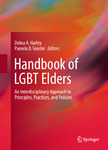Handbook of LGBT Elders
Abstract
As editors of this text, Pamela and I have over 40 years of combined
experience in service delivery; education; and research in aging, human
rights, disability, and social services. Beginning in 2013, we collaborated on
a chapter, Aging and Mistreatment: Victimization of Older Adults in the
United States, and as part of that chapter, we wrote about LGBT elders.
Afterward, we discussed the lack of focus and collaboration across disciplines
in addressing LGBT elders. Although discipline-specific books have
been published about LGBT populations, aging, health care, and human and
social service, we decided that the time had come for a comprehensive text
that addressed the challenges faced by LGBT elders. Our goal for this book is
to discuss both LGBT elders who are from groups for which research was
conducted often and groups rarely included in mainstream research (e.g.,
racial and ethnic groups, persons living in rural and remote areas, veterans,
[ex]-offender populations, immigrants, and persons with disabilities). In
addition, we decided to cover issues that impact LGBT persons individually
and collectively. Our 36 chapters cover the following topics pertaining to
LGBT elders: theories and constructs, the nexus of sexual minority status and
aging, family relationships, deconstruction of “isms,” African American and
Blacks, American Indians, Asian and Pacific Islanders, Europeans, Hispanics,
veterans, [ex]-offenders, immigrants, transgendered persons, bisexual
persons, mistreatment and victimization, bullying, healthcare reform and
healthcare practices, residents of long-term care facilities, end-of-life issues,
mental health, substance abuse, the impending US Supreme Court ruling on
same-sex marriage, ethics and ethical standards, law enforcement and public
safety, religious and faith communities, workplace issues, counseling,
socialization and recreation, advocacy, disability, and trends and future
directions. Our comprehensive handbook recognizes the intersection of
identities because individuals do not exist or live their lives in separate
compartments.
Collections
- School of Humanities [47]

